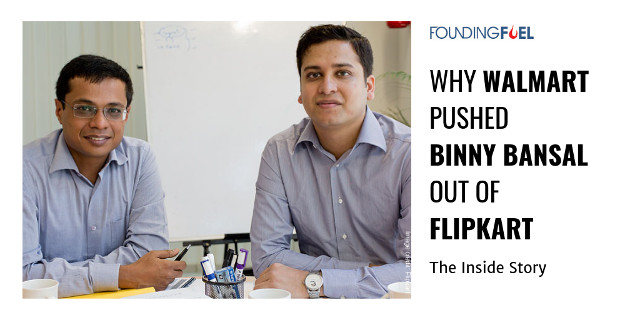[Volunteers prepare to plant a tree April 21, 2017, at Beale Air Force Base, California. Photo by Airman 1st Class Tristan D. Viglianco]
Dear friend,
Hope you had a great week.
This newsletter comes after our comprehensive ‘Best of 2018’ compilation. We covered a lot of ground in highlighting the broad themes that appealed to us. We do think it's worthwhile reminding you to glance through it in case it missed your attention. The link is here.
This week saw a big black swan event in the India startup scene. One of the celebrated co-founders of India’s well known Flipkart resigned following an investigation by the majority owner, Walmart. Indrajit Gupta researched this story and published a comprehensive piece here. Indrajit and NS Ramnath dug deeper to unearth the inside story—and added those details and perspective to the original.
It created a twitter storm and was actively commented upon. But we hope this triggers the beginning of a significant discourse on the topic of culture in startups.
ET Now, taking a cue from our story, asked two prominent startup stakeholders to weigh in on this. You can find the recording of entire exchange here.
We have great examples of entrepreneurial ventures like Infosys in India. These ventures took their time to scale up and build solid companies that went on to be the bellwether of the Indian business ecosystem. In contract, the idea of an Indian startup—fast growth, digital first, consumer-focused ventures—is reasonably new. A first wave lasted briefly in the late 1990s and then there was a second one that started in the mid-2000s and is currently underway. In the second wave that has lasted about 10-12 years, many young startups burst onto the scene, helmed by young educated college grads. They were highly tech literate with very little experience of running a business. But with support from venture capital firms to help them with the vital seed and growth capital, they continued to expand. Flipkart is exhibit A of such a company.
Contrast it with Silicon Valley, where I spent a good part of a decade. The startup culture there began in the 1950s and took root in the next 40 years. I bet most of us don’t know the real history of Silicon Valley. Steve Blank’s fabulous storytelling on this will put things in perspective for you. Watch it here.
I digressed. With this historical backdrop, the Valley had decades of experience in building and growing startups. That created a pool of skilled managers, advisors and mentors to support the growth of the startup ecosystem. The alchemy of metamorphosing a startup to an enterprise was perfected in the process. So, even though most startups in Silicon Valley are tech first and founded by technocrats, they invested early in talent and culture. A great example of this is Netflix whose document on culture was one of the most shared documents outside the company and revered inside. Contrasting this with the Indian startup ecosystem, we had very limited support by way of talent management, culture development and mentoring. Given the rapid growth some of them witnessed, many of the ventures went from being a toddler to an adult with limited supervision along the way. There was no adolescent period in their lives—the time when generally one gets prepared for adult life. Most of the founders, in their new found freedom looked at the enterprises they were building as an extension of their college dorm rooms. It worked for the initial camaraderie and intense ideation, but failed to provide them perspectives on building and scaling based on sound governance and a durable culture. The Flipkart episode might be a wakeup call to explore and urgently fix these gaps in the startups.
Best,
CS Swaminathan
On behalf of Team Founding Fuel
Featured Story
Flippin’ over backwards

Less than six months after their momentous deal with Walmart, both co-founders Sachin Bansal and Binny Bansal are out of Flipkart. It is a sad commentary on the hubris and the immaturity that’s gripped India’s high-flying tech entrepreneurs (By Indrajit Gupta with NS Ramnath. Read Time: 16 mins) Read Now
Here’s a collection of all the reactions to Founding Fuel's story. Track the comments and conversations on Twitter Moments
What We Are Reading
The Punctured Myth of Sheryl Sandberg
The "Lean In" author and Facebook executive is just another corporate warrior.
Tech C.E.O.s Are in Love with Their Principal Doomsayer
The futurist philosopher Yuval Noah Harari thinks Silicon Valley is an engine of dystopian ruin. So why do the digital elite adore him so?
When Ayn Rand Collected Social Security & Medicare, After Years of Opposing Benefit Programs
A robust social safety net can benefit both the individuals in a society and the society itself. Free of the fear of total impoverishment and able to meet their basic needs, people have a better opportunity to pursue long-term goals, to invent, create, and innovate
From Our Archives
For more than three years now Haresh Chawla has been writing in Founding Fuel about the tensions facing startups and their founders. His voice is a prescient one. Here’s a selection from his commentary.
The Rahul Yadav Story You’ve Never Heard Before

[By Jasveer10 (CC BY-SA 4.0), from Wikimedia Commons]
An insider's account of what went wrong with a brilliant 20-something IIT dropout’s entrepreneurial journey. Read Now
Walmart’s Flipkart buy will unleash a battle royal with Amazon and Alibaba

[By Mike Mozart of TheToyChannel and JeepersMedia on YouTube, under Creative Commons]
As Walmart muscles into Indian e-commerce, the global war for retail dominance has a new battleground. Read Now
Saving Private Flipkart

[Photograph by Hemant Mishra - Mint]
Flipkart is in the middle of a crisis of its own making—stalled growth compounded by management churn and the imminent possibility that it will cede the top slot to Amazon. But it’s not too late to change its strategy. Read Now
The fault in our startups

[Image:Supernova remnants by NASA/CXC/U.Texas.]
Internet startups are cloning business models from the West, without much thought on how to Make in India. Read Now



